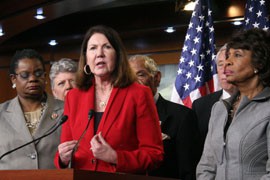Cronkite News has moved to a new home at cronkitenews.azpbs.org. Use this site to search archives from 2011 to May 2015. You can search the new site for current stories.
Senate votes to let tribal courts try non-Indians in domestic, sexual assault cases
WASHINGTON – Native American and women’s groups welcomed the Senate’s reauthorization Tuesday of the Violence Against Women Act, which includes a provision to let tribal courts prosecute non-Indian suspects in domestic and sexual abuse cases.
But they conceded that the measure still faces a fight in the House before it can become law.
The act expired in 2011 and the bill to renew it would extend the protections of the previous law to gay partners and immigrants, as well as extending jurisdiction of tribal courts to prosecute non-members in such cases.
Supporters said the tribal courts language is needed because, under current law, only federal courts can prosecute a non-Indian accused of domestic violence or sexual assault against an Indian woman. But few do.
“The vast majority of women who are assaulted by non-Indian men are seeing no justice,” said Lucy Rain Simpson, director of the National Indigenous Women’s Research Center in Tucson. “The problem is that U.S. attorneys decline to prosecute a vast majority of these cases.
“Perpetrators know there is no justice in Indian country,” said Simpson, who summed up the situation of prosecution as one where tribes can’t, states can’t and the feds don’t.
The Senate’s 78-22 vote to renew the act followed a failed attempt Monday to strip out the tribal courts language. That amendment, from Sen. Tom Coburn, R-Okla., failed 31-59, with 10 senators not voting.
Coburn backers like Sen. John Cornyn, R-Texas, argued that the provision to extend tribal authority was unconstitutional and could violate the civil rights of a defendant who did not belong to a tribe.
But supporters said the law is written to limit prosecution only to defendants who have a direct relation to the tribe.
“They are focused on individuals that have a real connection with the tribal communities,” said former Associate Attorney General Tom Perrelli. “People should expect that they could be called to account.”
And Jared King, a spokesman for the Navajo Nation Washington Office, said tribal courts are ready to handle such cases.
“There are a number of tribal court systems throughout the country that are advanced and have the capacity to take on those cases, should the bill with the tribal provisions be passed,” he said.
Simpson said opponents are just making excuses.
“I think it’s really about a state’s rights issue,” she said. “They don’t want to be able to see a tribal government exercising the power they (the tribes) have as sovereign nations.”
She cited a 2010 Government Accountability Office report that said even severe sexual assault cases are ignored most of the time by federal prosecutors. But it is important to stop the cycle, she said.
“Once a perpetrator commits domestic violence once, a lot of studies say the lethality progresses,” Simpson said. “The likelihood that the woman will end up being killed due to domestic violence jumps.”
But Simpson believes that there are finally “a lot of congressmen and women who are beginning to understand this issue.”
“It’s really … the idea that the Violence Against Women Act really should provide justice for women, not just some women,” she said.
Arizona Republican Sens. John McCain and Jeff Flake both voted to strike the tribal provision Monday. When that amendment failed, however, they both voted in favor of final passage of the bill Tuesday.
National Congress of American Indians spokesman Thom Wallace was hesitant to be overjoyed at the Senate passage of the bill. While it is good that the bill can move forward, he said NCAI is just focusing on the present.
“Members of Congress across the board – senators and representatives – have the opportunity to look at the stark reality that faces Indian Country: that offenders can walk free to commit crimes against women on tribal land,” Wallace said. “Providing tribes the local authority that other governments have is essential for providing security and safety on tribal lands.”







